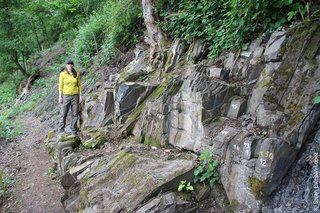Thanks to the GSGS Start-up honours grant, I was able to begin my PhD project, which examines the accumulation conditions of the Lower Alum Shale (Lower Carboniferous) and will hopefully determine whether a transgression or a waxing ice shield was responsible for the sedimentation conditions under which this shale developed.
During the last six months I wrote parts of a DFG proposal and was able to participate in an English academic writing course, given by Anne Wegner, organized by the GSGS. Furthermore, I sampled and surveyed a section in Belgium and started working with samples I collected in May 2014 at a study site in Wuppertal Riescheid.
The study site in Wuppertal Riescheid was sampled in two steps. The first step involved taking shale samples of the Kahlenberg Formation (equivalent of the Lower Alum Shale in the Culm basin facies of Germany). In a second step, samples of a succession of limestones, which are intercalated in the shales (Fig.1), were taken. Part of the collected samples has been cut down to thin-sections and another part of the samples was treated with formic acid and subsequently sieved. The grain size spectrum 0.1 - 1.0 mm will be searched for conodonts and agglutinating foraminifera. The thin-sections were investigated under a microscope to separate the present lithologies into three microfaciestypes.
The study site in Belgium is situated on a railroad cut in Dolhain, near the train station. This section was sampled and surveyed on the 25th and 26th of October 2014. The succession of the Pont d’Arcole Formation (Lower Alum Shale equivalent) was divided into 38 beds and is 12.16 m thick.
Sarah Esteban Lopez
PhD Student
Institute of Geology and Mineralogy
Thesis: Lower Alum Shale – How global is a global event?
Supervisor: Prof. Dr. H.-G. Herbig (Palaeontology)
